Do you forget to water your plants often? You should go with these Best Drought Tolerant Plants that Grow In Lack of Water!
Drought-tolerant plants aren’t just great for forgetful gardeners. You can plant these if you live in a hot area or have scarce water.
Best Drought Tolerant Plants
You should know that there are no plants that don’t need water. Being drought tolerant doesn’t mean they can live without water–they just need it in smaller amounts and can handle being watered once in 5-7 days.
1. Agave
Botanical Name: Agave
USDA Zones: 5-11
Agave succulents have thick leaves that store water, so they can survive without water for quite some time. Plus, they have a magnificent shape and size.
2. Lithops
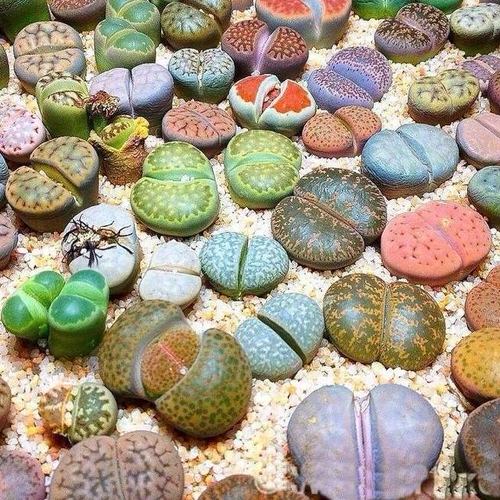
Botanical Name: Lithops
USDA Zones: 9-12
Lithops is small and looks like a stone. It also needs little water to thrive and makes a great succulent display. Water them once, and you won’t need to do it again for 1-2 weeks.
3. Sedum
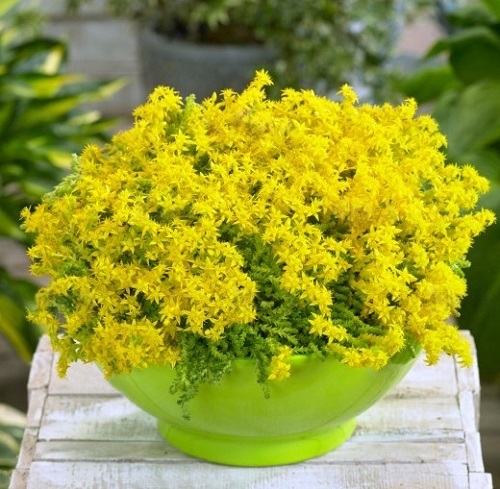
Botanical Name: Sedum
USDA Zones: 7-11
Sedums are incredibly drought-tolerant. These plants grow in all kinds of soils and need watering once in 8-10 days. Also, they love the sunlight.
4. Desert Rose
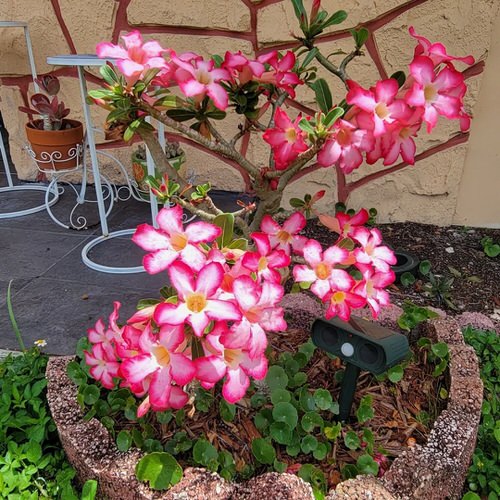
Botanical Name: Adenium obesum
USDA Zones: 9-12
Desert Roses are perfect if you love flowers but want plants that need little water. You can also grow them as houseplants. Just water them once every 10-12 days.
5. Jade Plant
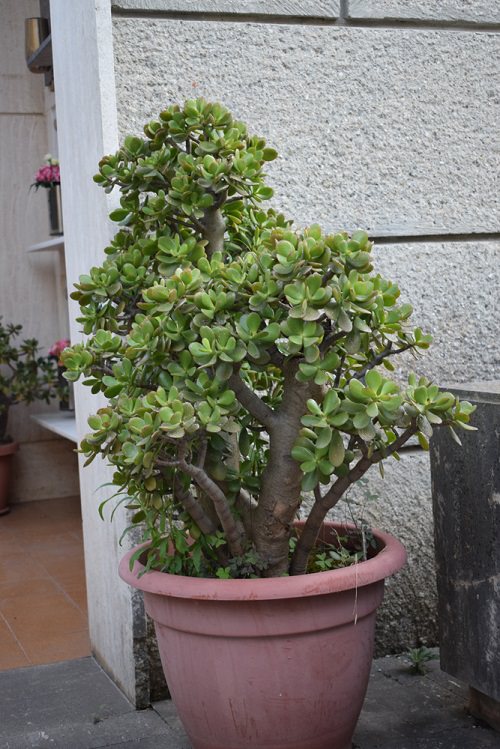
Botanical Name: Crassula ovata
USDA Zones: 9-12
Jade is a popular succulent with fleshy, paddle-shaped leaves. It is also believed to bring good luck to its owner. And it doesn’t need watering often.
6. Cacti
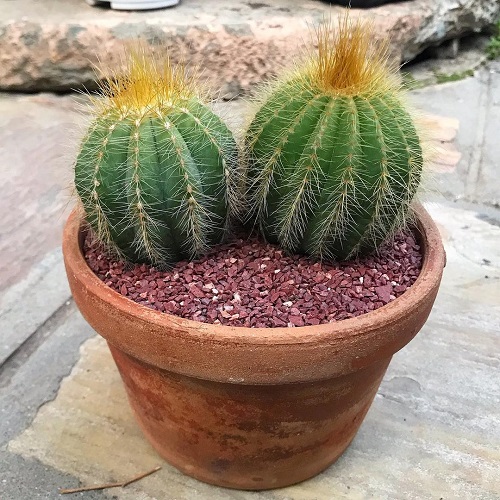
USDA Zones: 6-12
You must know about cacti, which do remarkably well in little water. Their foliage has developed into spines, so they don’t lose water via them. Why not grow one?
7. Bougainvillea
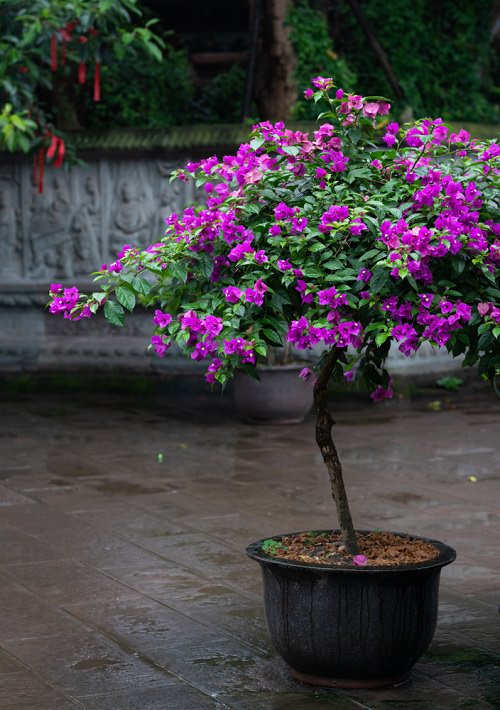
Botanical Name: Bougainvillea
USDA Zones: 9-11
Bougainvillea is a drought-tolerant champion and easily one of the toughest shrubs. Why? It can last 3-4 weeks after a deep watering without needing it again.
8. Moss Rose
Botanical Name: Portulaca grandiflora
USDA Zones: 3-11
Moss Roses need watering just a couple of times in spring and fall. In winter, even less. Plus, they give really pretty flowers.
9. Blanket Flower
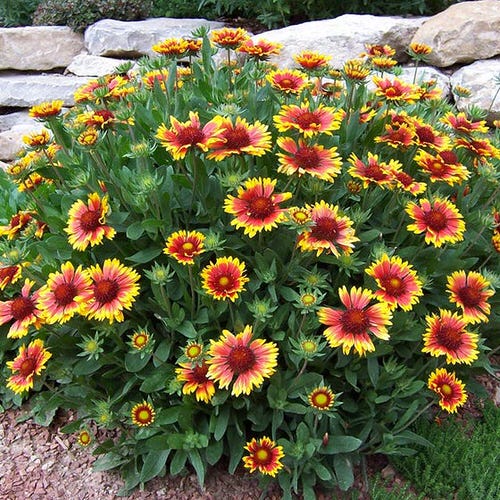
Botanical Name: Gaillardia
USDA Zones: 3-10
Blanket flowers are essential because they serve as caterpillar food. So they’ll attract pretty butterflies in your garden. And these plants that don’t need much water–just once a week.
10. Verbena
Botanical Name: Verbena officinalis
USDA Zones: 9-11
If you’ve been looking for a drought tolerant ground cover, Verbena should be your top choice. It does really well in full sun and needs watering once in 8-10 days. Sometimes even more.
11. Lantana
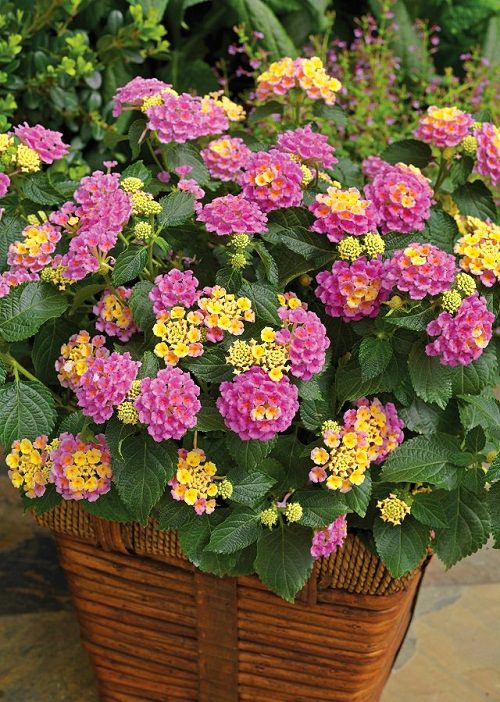
Botanical Name: Lantana camara
USDA Zones: 9-11
Lantana loves heat and drought and is known for being less demanding. It’s invasive, so it’s better to grow it in pots.
12. Wallflower
Botanical Name: Erysimum
USDA Zones: 6-9
Wallflowers are perennials and need proper watering only when they are growing. After they mature, they don’t need much water.
13. Oleander
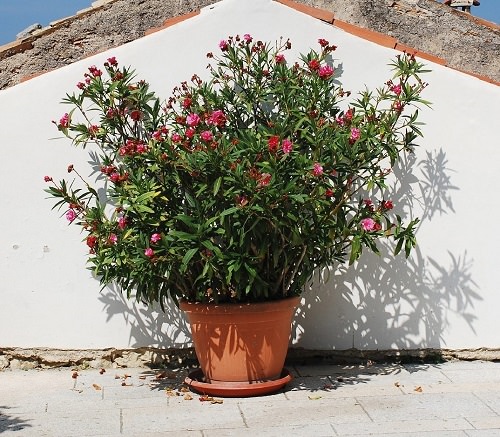
Botanical Name: Nerium oleander
USDA Zones: 5-9
Oleander shrubs are dense and can be great container or border plants. You only need to water them once in 3-5 days.
14. Rock Soapwort
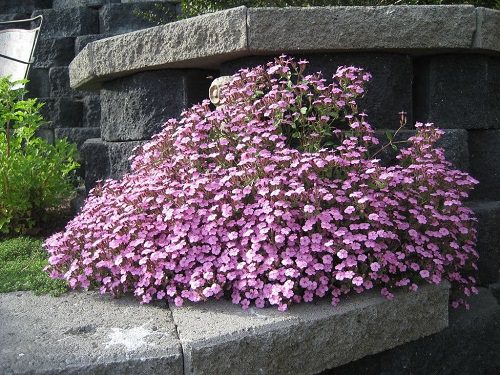
Botanical Name: Saponaria ocymoides
USDA Zones: 3-8
Notice how this whole plant is covered in pretty pink flowers? They bloom best in little water and only need it once a week.
15. Sage
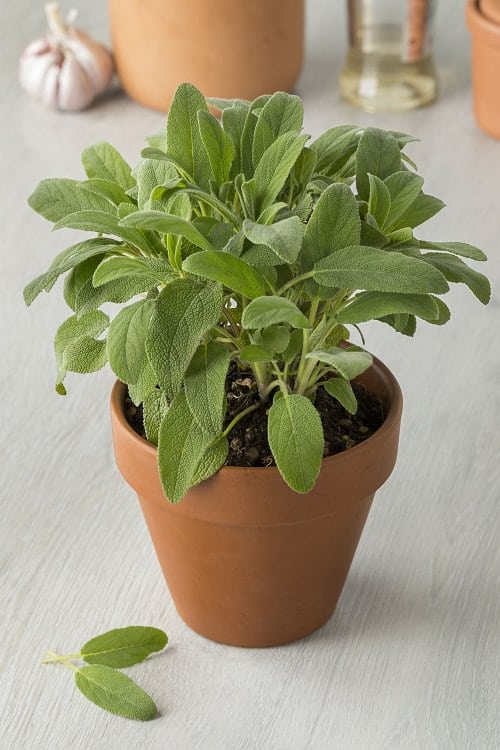
Botanical Name: Salvia officinalis
USDA Zones: 5-10
Sage is a herb that’s really drought-resistant. You’ll need to water it once in 7-8 days and it will keep on giving you leaves to use in dishes.
16. Poppy
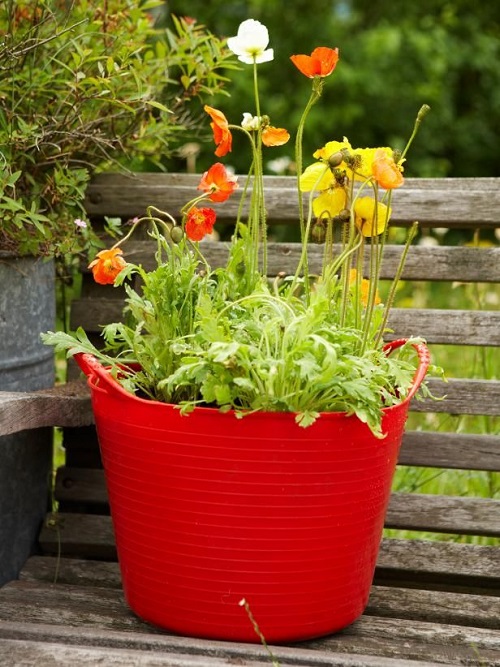
Botanical Name: Papaver
USDA Zones: 3-8
Poppies are a great addition to gardens and homes. They need plenty of sun and will grow in a lack of water making them really drought tolerant plant choices.
17. Lavender Cotton
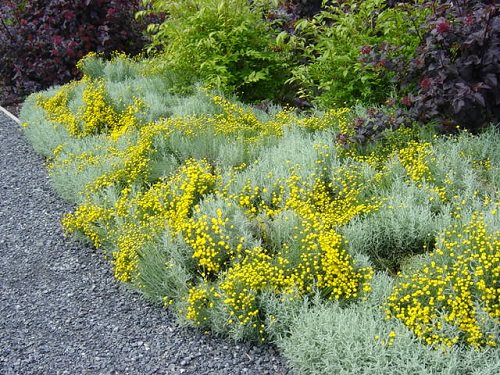
Botanical Name: Santolina chamaecyparissus
USDA Zones: 6-9
Cotton Lavender is a pretty shrub with silvery foliage and tiny yellow flowers that can grow in just a bit of water for up to 10 days before it needs a soak again.
18. Lavender
Botanical Name: Lavandula
USDA Zones: 5-9
Lavender is also drought tolerant. It’s really easy to grow and will fill up your home and lawn with its sweet fragrance without demanding a ton of water.
19. Rock Daisy
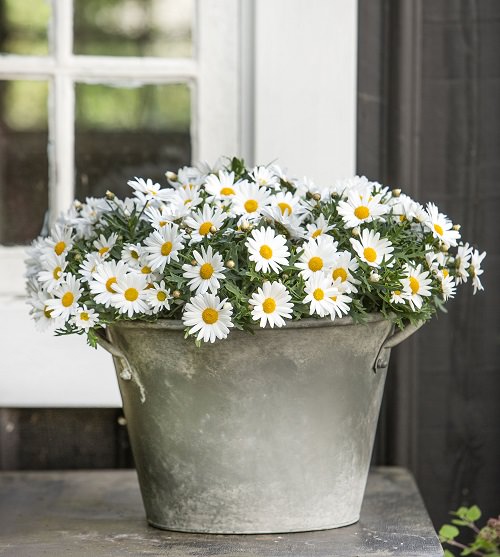
Botanical Name: Perityle
USDA Zones: 5-11
Rock Daisies are great plants for rock gardens and have beautiful flowers. They thrive in neglect and will survive even in a lack of water.
20. Globe Thistle

Botanical Name: Echinops
USDA Zones: 3-9
Globe Thistle plants are drought tolerant because of their long taproots. New ones need watering once a week, but once they’re established, you only need to do it every 15 or so days.
21. Rose Campion
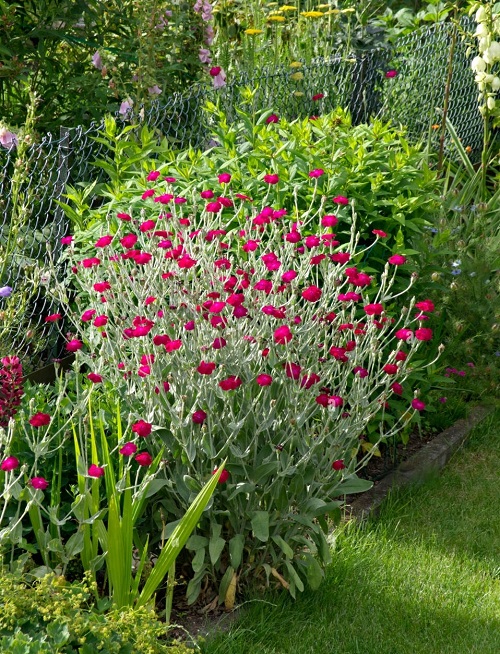
Botanical Name: Silene coronaria
USDA Zones: 3-8
Rose campion has beautiful flowers and silver foliage that catches the eye. Once established, it can survive with little to no watering, especially during hot and dry periods.
22. Red Valerian
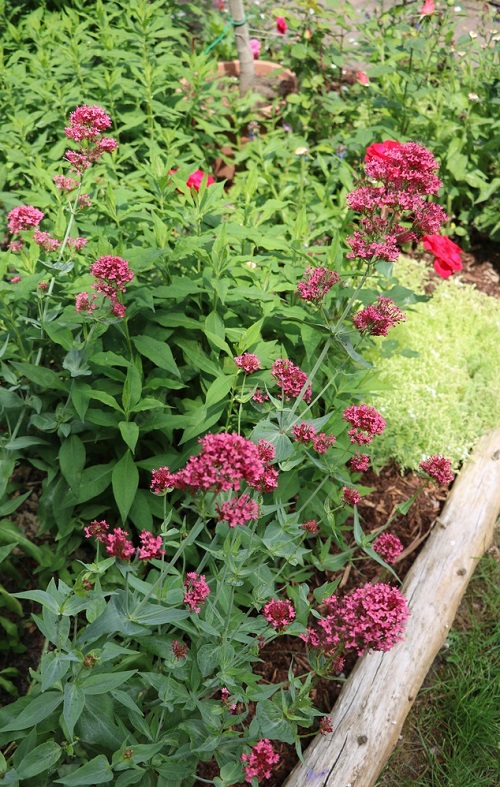
Botanical Name: Centranthus ruber
USDA Zones: 5-8
Red Valerians are excellent choices for xeriscaping because they can survive in just a bit of water. Plus, they need full sun.
23. Crown of Thorns
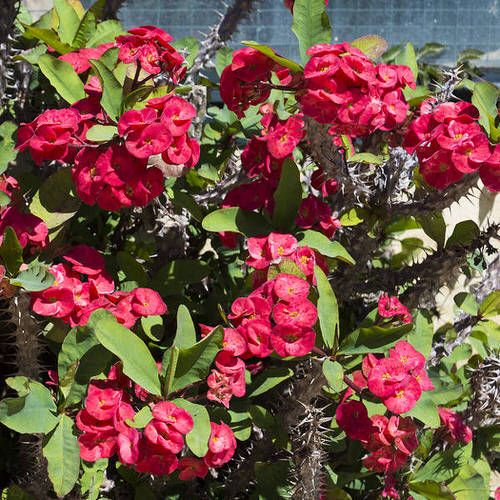
Botanical Name: Euphorbia milii
USDA Zones: 5-11
Crown of Thorns are also plants that require little water. Plus, they bloom almost year-round. It’s the perfect drought tolerant flowering plant!
24. Russian Sage
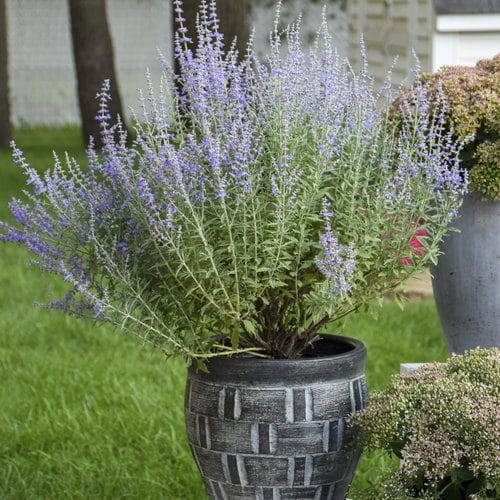
Botanical Name: Perovskia atriplicifolia
USDA Zones: 5-9
Russian Sages are used as ornamental plants, but they’re really drought-tolerant. Water them every 10-15 days, and they’ll reward you with pretty flowers.
25. Yarrow
Botanical Name: Achillea millefolium
USDA Zones: 3-9
Yarrows are low-maintenance plants with decorative foliage. They’re suitable for borders, wildflower meadows, and rock gardens and need watering once a week or ten days.
26. Pineleaf Penstemon
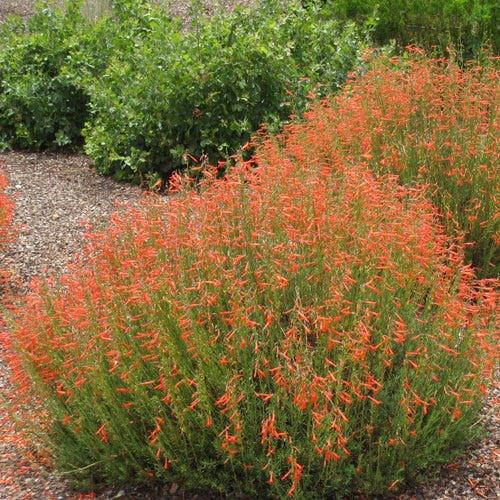
Botanical Name: Pineleaf Penstemon
USDA Zones: 4-9
Pineleaf Penstemon is an herbaceous perennial and low-maintenance plant. Its wonderful scarlet-red flowers attract hummingbirds and butterflies alike. Plus, it can survive in a lack of water.
27. Giant Hyssop
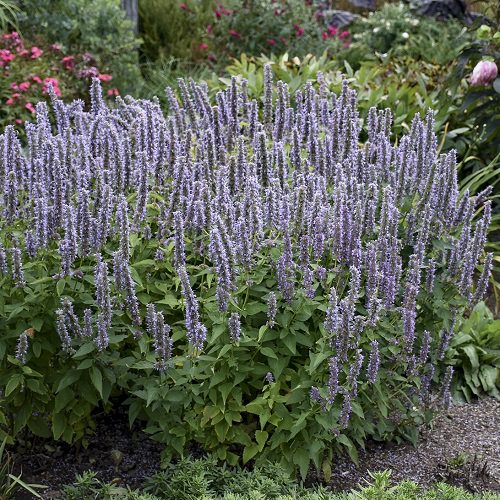
Botanical Name: Agastache
USDA Zones: 4-10
Boasting pink, blue, white, or orange flowers, Giant Hyssop is a drought-loving plant. It needs weekly watering for the first month but after that, you can ease it up.
28. Beardtongue
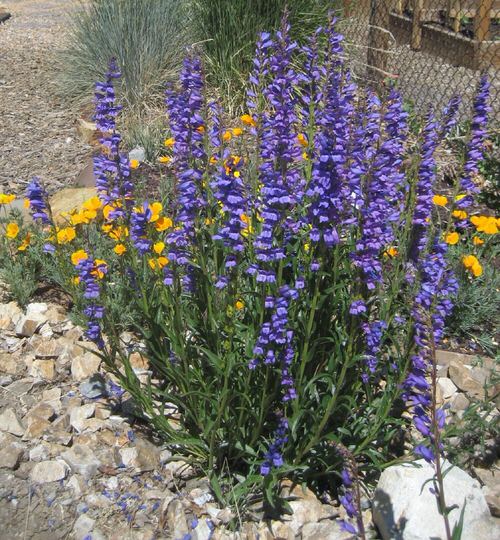
Botanical Name: Penstemon
USDA Zones: 3-9
Beardtongue has clusters of tube-shaped flowers on rigid stems. These plants become drought-tolerant after maturity and require watering every couple of weeks.
29. Coneflower
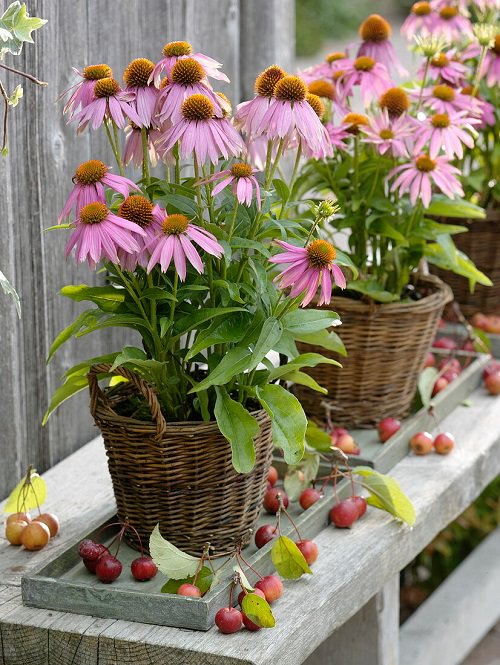
Botanical Name: Echinacea
USDA Zones: 5-10
Coneflowers are quite drought-tolerant, but they need little maintenance from time to time. You can grow them in any soil type with good drainage.
30. California Poppy
Botanical Name: Eschscholzia californica
USDA Zones: 7-11
California Poppies are fast-growing plants that don’t require much water and thrive in full sun. They can also handle partial shade but need well-draining, sandy/loamy soil.
31. Purple Fountain Grass
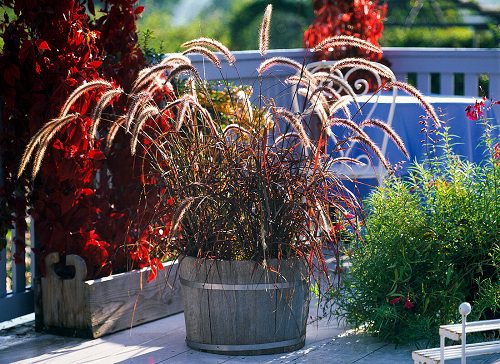
Botanical Name: Pennisetum setaceum ‘Rubrum’
USDA Zones: 9-11
Purple Fountain Grass is a famous ornamental, clump-forming grass with purple-red narrow leaves. This drought-tolerant specimen can be managed for many days in a lack of water.
32. Kangaroo Paw
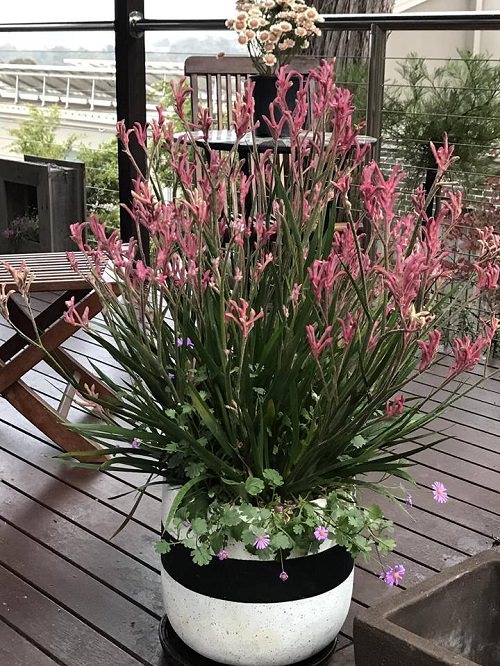
Botanical Name: Anigozanthos spp.
USDA Zones: 9-12
Native to Australia, Kangaroo Paw grows in dry, sandy regions and can withstand long dry spells due to the sap conserved in the roots.
33. New Zealand Tea Tree
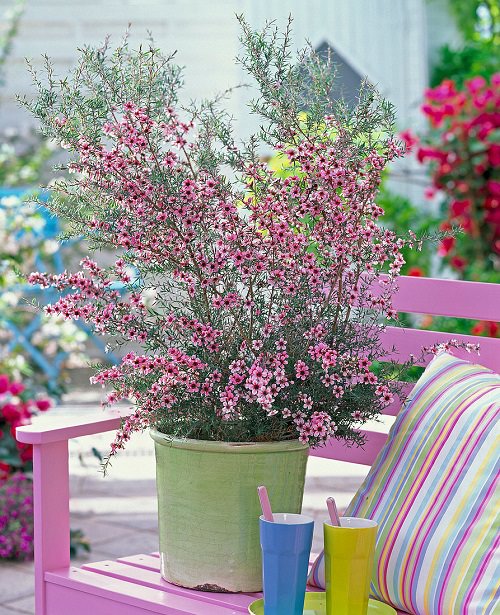
Botanical Name: Leptospermum scoparium
USDA Zones: 8-10
Also popular as Manuka, the New Zealand Tea Tree is an evergreen shrub that has fragrant, prickly, small foliage and pink, white, or red blooms. It doesn’t need much water either.
34. Twinberry Honeysuckle
Botanical Name: Lonicera involucrata
USDA Zones: 4-8
The Twinberry Honeysuckle is a deciduous shrub with orange-red blooms. These flowers have trichomes (tiny hairs) that catch water and hold onto it, making the plant drought-tolerant.
35. Pride of Madeira
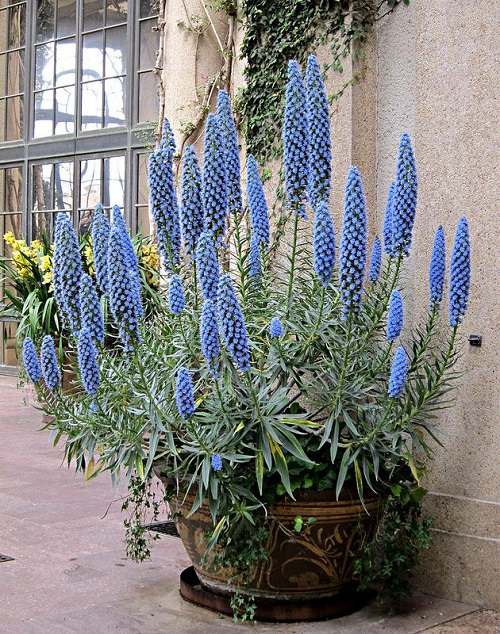
Botanical Name: Echium candicans
USDA Zones: 9-10
Pride of Madeira is an evergreen plant with stunning blue flowers and has a mounding growth habit. It grows naturally on rocky cliffs and tolerates dryness very well–like some plants that don’t need watering.
36. Trumpet Vine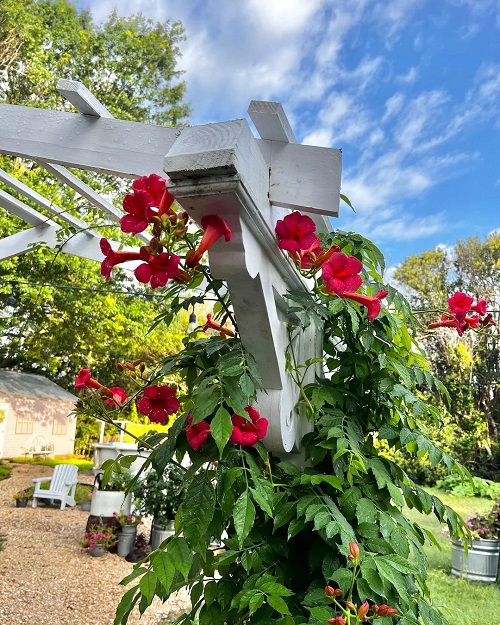
Botanical Name: Campsis radicans
USDA Zones: 4-11
The flowering Trumpet Vine is quite drought-tolerant and can be grown in various conditions. It grows fast with bright green leaves and needs watering once a week.
37. Catmint
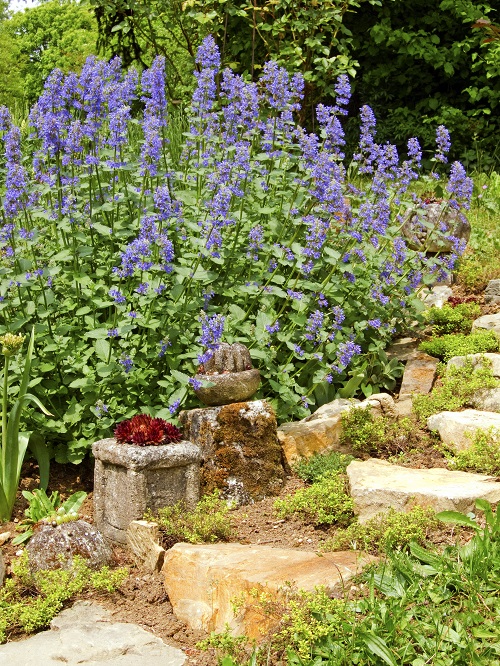 Botanical Name: Nepeta x faassenii
Botanical Name: Nepeta x faassenii
USDA Zones: Zones 3 to 8
Catmint is a great drought-tolerant choice for borders and pots. Its fragrant flowers lure in butterflies and bees.
38. Artemisia
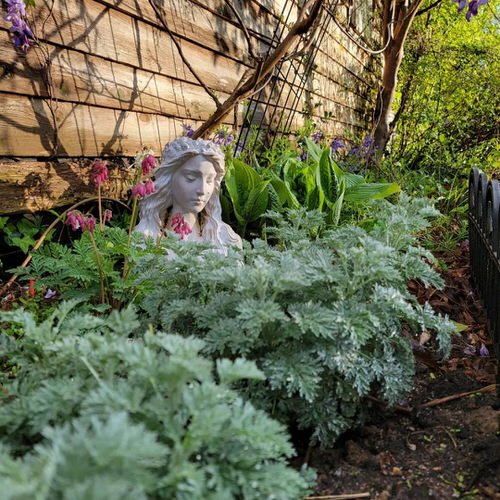
Botanical Name: Artemisia spp.
USDA Zones: 3-8
Artemisia is admired for its pretty, slender, gray-to-silver foliage on tall stems. But many people don’t mention its ability to survive in a lack of water.
39. Licorice Plant
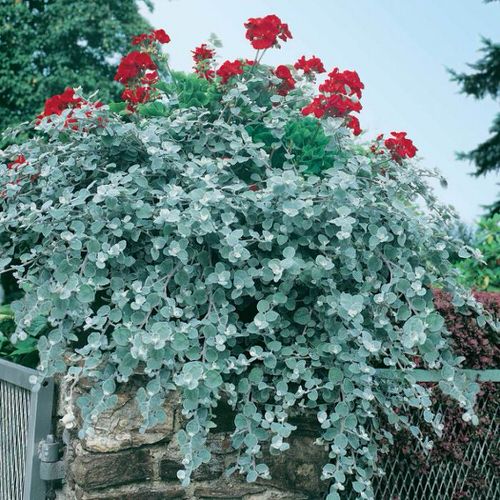
Botanical Name: Helichrysum petiolare
USDA Zones: 9-11
Licorice plant is loved by gardeners for its spreading growth pattern and fuzzy, silver leaves. It thrives well in partial shade to full sun.
Note: Remember that it is not edible or used to make licorice. Also, it is listed as an invasive plant.
40. Aloe
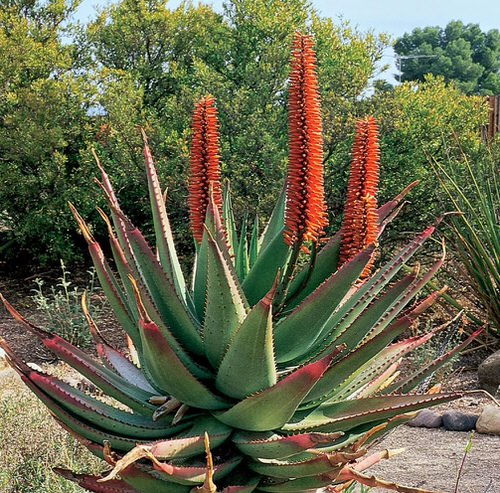
Botanical Name: Aloe spp.
USDA Zones: 10-12
Aloe species can grow in drought-like conditions easily. The best ones for landscaping are Coral, Tiger, Soap, and Jewel Aloe.
41. Artichoke
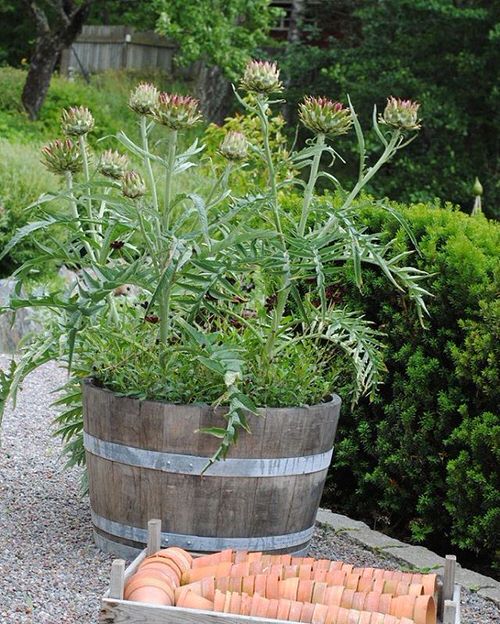
Botanical Name: Cynara cardunculus
USDA Zones: 7-11
Artichokes are another lovely option if you often forget to water your plants. You can even relish delicious artichokes it will give you.
42. Palo Verde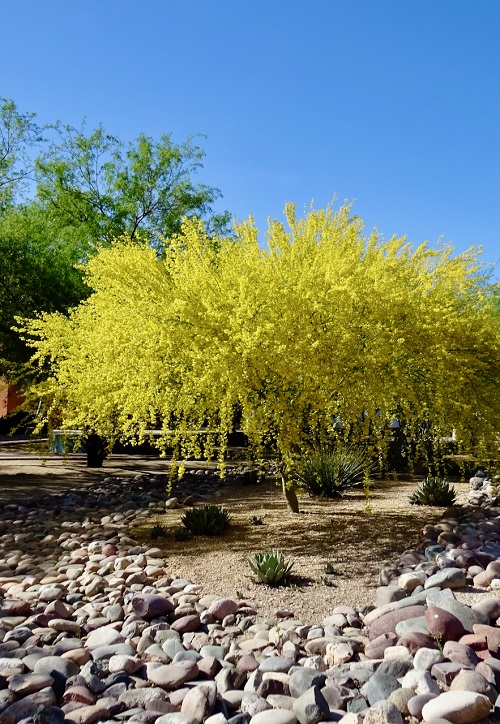
Botanical Name: Parkinsonia spp.
USDA Zones: 8-11
Palo Verde is native to semi-deserts of Africa and America and is an excellent drought-tolerant tree. Once it’s 2-3 years old, you only need to water it once in 1-2 months.
43. Geraniums
Botanical Name: Pelargonium spp.
USDA Zones: 9-11
Most varieties of Geraniums can survive heat and little watering. But hardy ones, like Bigroot Geranium, are exceptionally drought tolerant once established.
44. Wild Lilac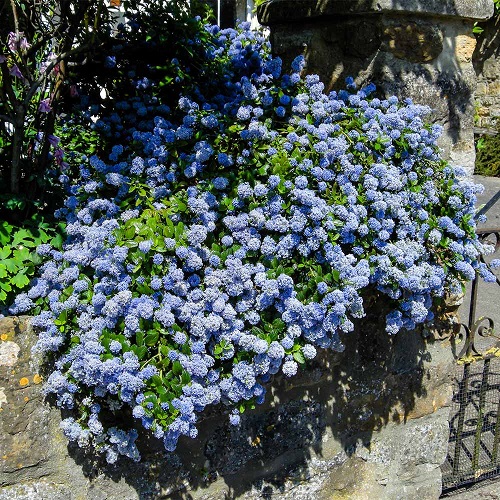
Botanical Name: Ceanothus
USDA Zones: 8-11
Wild lilacs are colorful and fragrant shrubs that are evergreen and considered one of the best drought-tolerant flowering plants. You can grow them in the landscape as hedges, ground covers, and borders.
45. Rosemary
Botanical Name: Rosmarinus officinalis
USDA Zones: 8-11
Rosemary has needle-like foliage that prevents water loss, making this herb drought-tolerant. You will only need to water it once in 10-15 days.
46. Yucca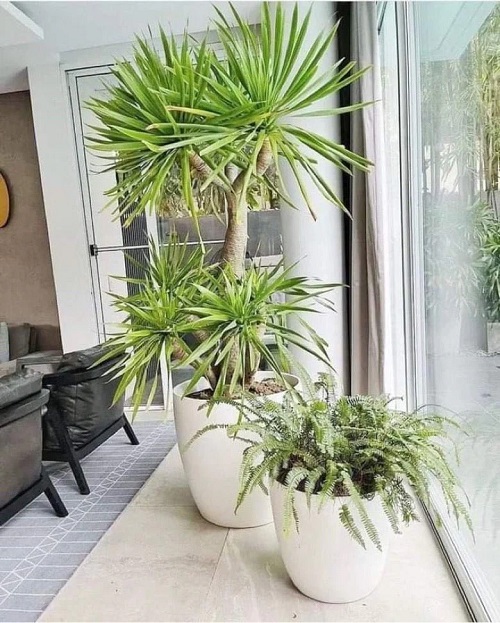
Botanical Name: Yucca
USDA Zones: 4-11
Yuccas have thick, fleshy roots that act like succulents and allow them to retain water for a long time. So even when you water them less, they can hold their own.
47. Black Eyed Susan
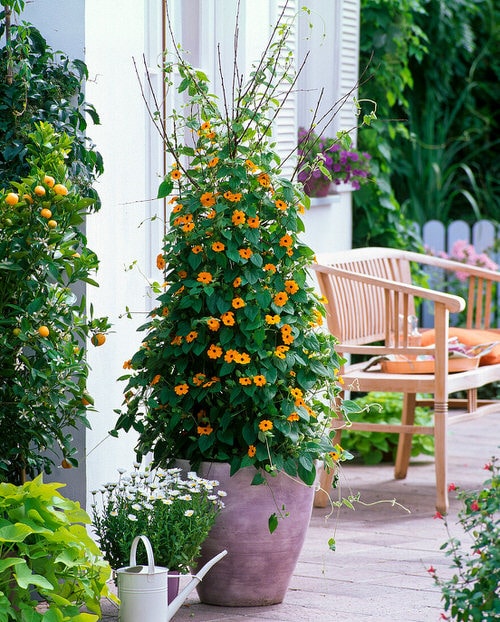
Botanical Name: Thunbergia alata
USDA Zones: 8-11
Black-eyed Susans are great at two things–they can survive in a lack of water and they can also do without fertilizer.
48. Butterfly Weed
Botanical Name: Asclepias tuberosa
USDA Zones: 4-9
Butterfly Weed is also drought tolerant and won’t need water until the soil runs dry. So you can water it once and wait 8-10 days before doing it again.
49. Hens-and-Chicks
Botanical Name: Sempervivum tectorum
USDA Zones: 3-11
A succulent with rosettes of fleshy leaves that resemble miniature cabbages, Hens-and-chicks are the definition of drought tolerance and can stay alive between long water spells.
50. Ice Plant
Botanical Name: Delosperma cooperi
USDA Zones: 6-9
Ice plants are gorgeous, with succulent, finger-like leaves and vibrant, daisy-like flowers. Their thick, fleshy leaves also make them drought-tolerant.
51. Creosote Bush
Botanical Name: Larrea tridentata
USDA Zones: 7-11
Creosote Bush is from Southwest America and can survive for decades with a bit of watering. It has an extensive root system that helps it tap into deep water reserves.


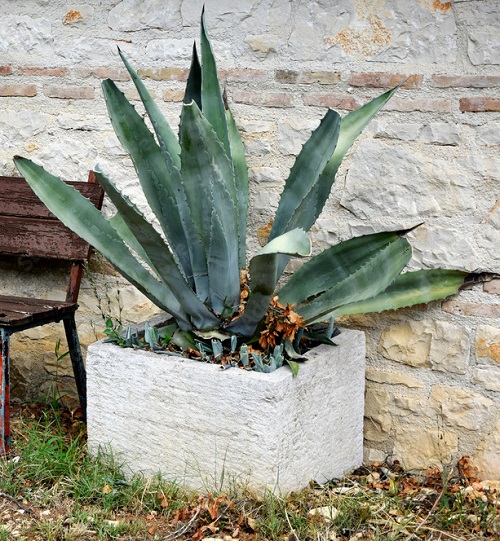
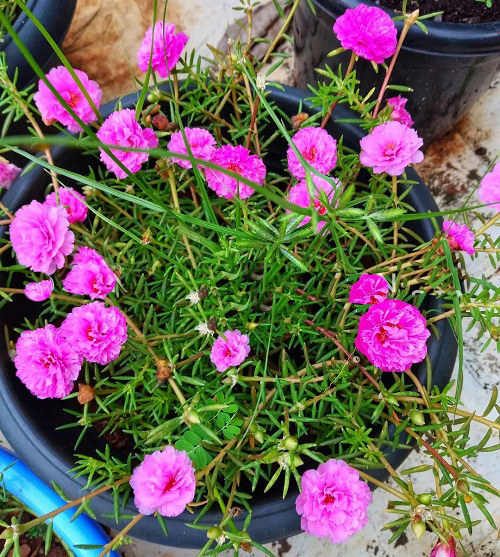
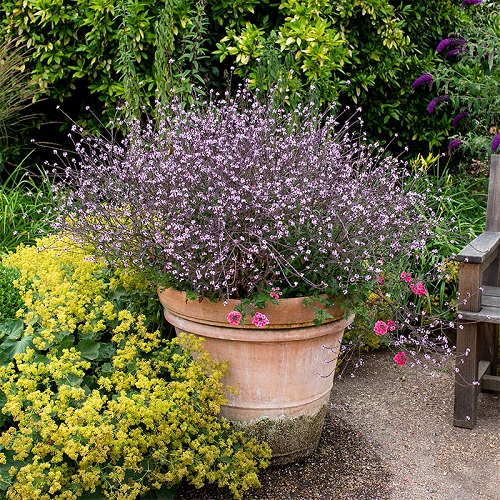
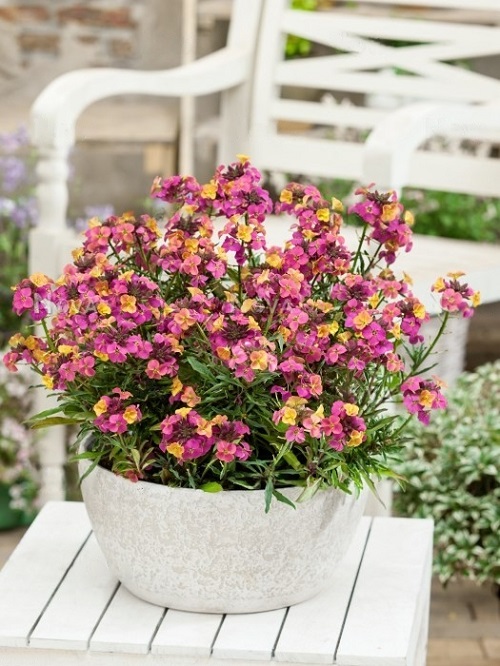

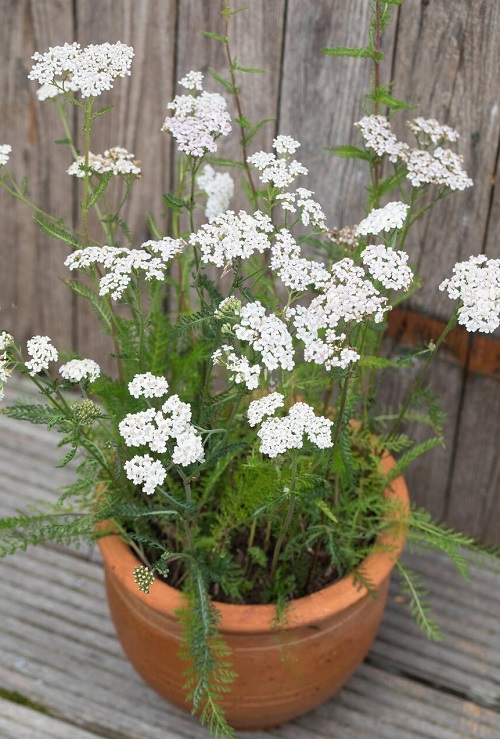
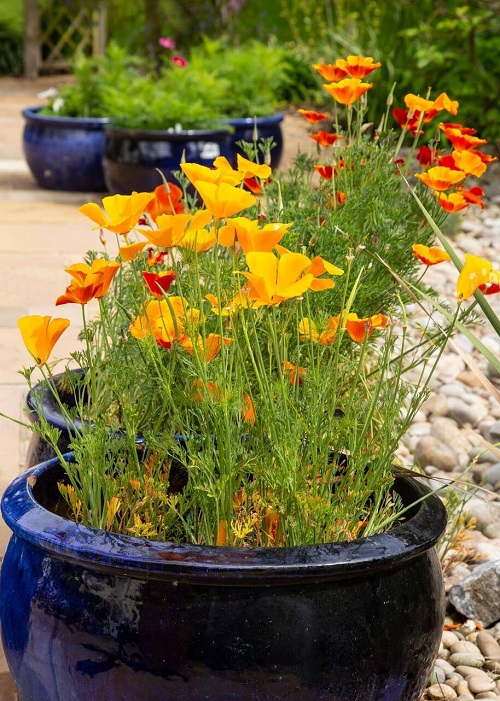
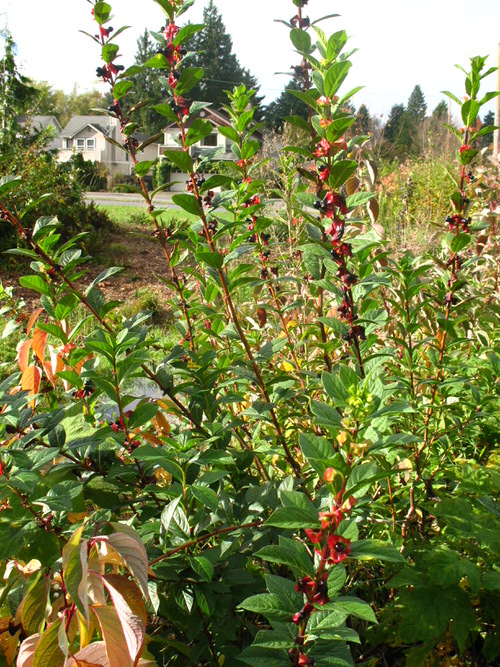
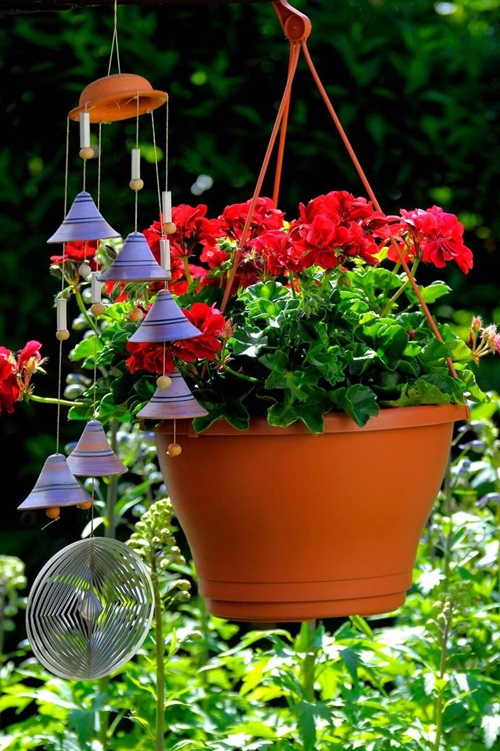
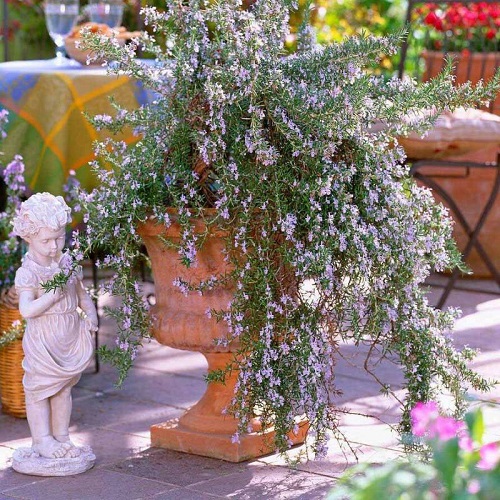
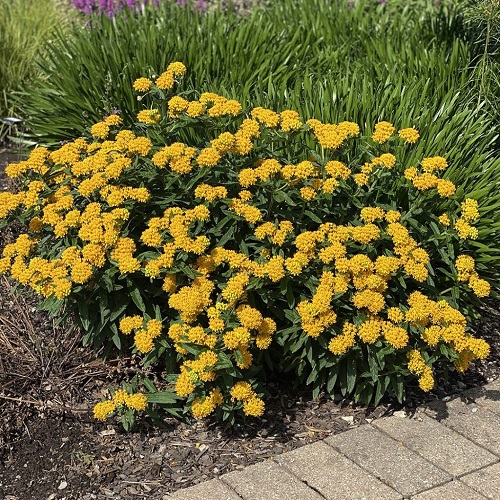
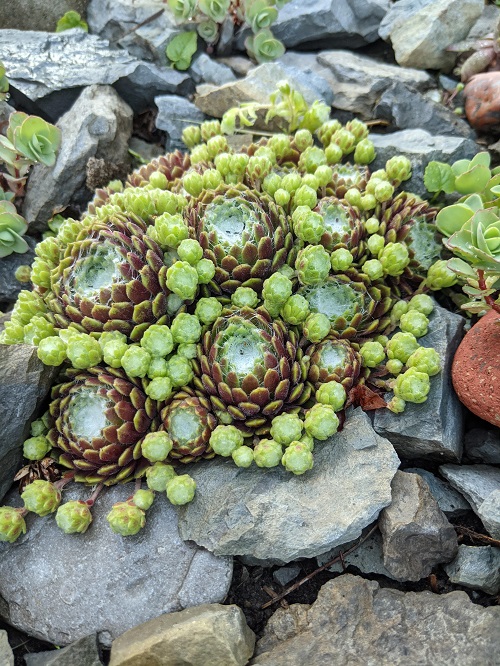
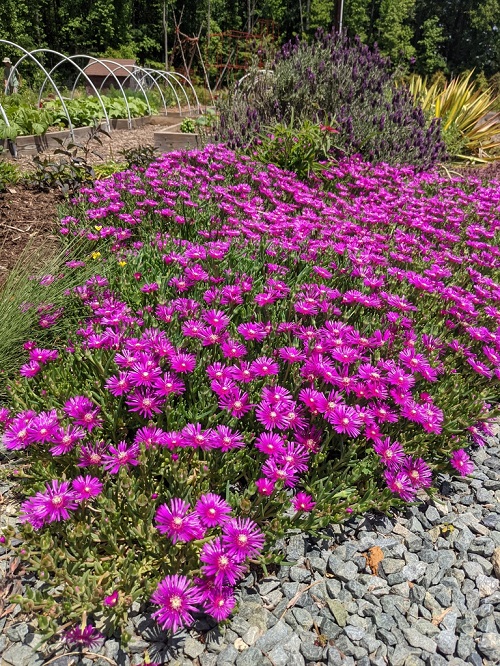
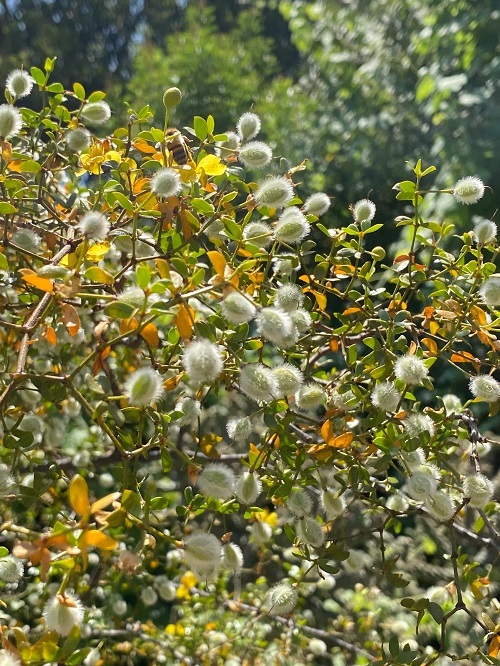

Plz put Venus flytrap
is the Venus Flytrap evn a Drought Tolerant Plant?
lol they are bog plants
Thanks. Great article
Many of these are tropicals and will not grow well in zone 7 or lower. They cannot survive winter. Lantana is great, but doesn’t smell very nice.
I liveon vancouver island and they grow just fine for me but they do act as perrenials and the seed pavks say annuals.
Right.
I think lantana smell yacky.
Thank you so much
Some newer varieties of lantana have better fragrance..except the “grape”!
Don’t let Lantana get away on you! Has turned into an environmental disaster in Australia 🙁
Lantana, although an introduced species actually provides a safe home or hideaway from birds for our smaller native rodents and marsupials. It was first introduced by a wealthy English family at Daisy Hill in QLD. I learnt about it on a year 12 biology/ecology field trip to the nature reserve there.
So informative
please advise how to grow Lantana in the same way as from the pot from this page ? thanks
Please advise on how to grow lavender from seeds.Tried various tips but not successful. Saplings not available in our place.
Lantana is also poisonous…just always wash hands don’t stick your fingers in your mouth..
Lantana is NOT poisonous. That is a myth perpetuated by a few folks. I have done a lot of research and the general consensus is that the plant is not poisonous. I have grown it for over 20 years and have never had a problem with it.
I have heard Lantana is dangerous to cows.
I hate flowers
They hate you too.
LOL! Thank you!
Oleanders clog sewer lines, also currently undergoing a blight in Arizona
Just add “pet-friendly” when applicable – the most beautiful garden isn’t worth losing a beloved pet!
Helpful, but not exactly what I’m looking for…I need to find plants that are good for Part shade/Part sun, and don’t need much watering, but most importantly, child friendly and pretty.
Salvias are a good choice, as well as lavender!
I just learn something new. Thank you
thanks . it will help me in my thesis studies.
Hi I have a caravan on solway firth, and have a few ceramic pots, which I would to put plants in but I am only there every 3 weeks. Is there any plants that would be suitable. In the winter I put pansies in and they were great. Thank you
I have grown Lantana several times and never knew it was poisonous..that is scary . I will research it more, thanks
I live in SC, what do you advise me please? Thanks
Where can I buy these types of plants?????
Nana k
is the Venus Flytrap evn a Drought Tolerant Plant?
What kind of produce can be bought that is drought resistance in Phoenix AZ?
I have 2 large terracotta pots at my front door, I have one with impatiens in it. what other flowers can I plant in them, I know impatiens dont like sun so both pots are in shady areas, no sun at all so I kind of want something that will grow needing no sun but not too big wither.
No.
Wild lilac species are fragrant and colorful shrubs. They re evergreen and drought tolerant, and they can be used in the landscape as screens, hedges, ground covers, borders, and more. While most wild lilac species are native to California, some grow in the eastern U.S., the Rocky Mountains, the Pacific Northwest, and Mexico. Some grow upright; some are compact and bushy; and some are low-growing and spreading.
cactus.
I have had Lantana in my butterfly garden for many years. Butterflies love lantana. The colorful, nectar-rich flowers that these plants and shrubs produce are called “butterfly magnets” by many garden centers and nurseries. Their bright colors, tight bunches of blossoms, and flat structure make lantana the perfect choice for any butterfly garden.
They are not